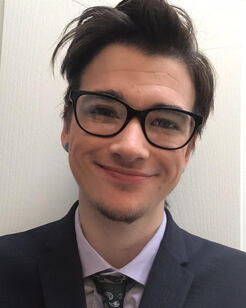 What happens when your Transgender loved one dies, or someone trans around you? What if they come across your care while working your profession? When it comes to being transgender, or anything variant of "Male" or "Female" even just being intersex, its taboo. You don't really think about it unless it's you, or someone you love, let alone think about end of life. Nobody really thinks of death normally right? Not unless your in a death aware state? I'm just one of a niche population and I am absolutely death aware. As a result have my fears regarding my own death and memorialization as a transgender male. I have a lot of privileges in my own societal stance, especially to the ones who consider themselves privileged. I am a white male-identifying human, I have a stable job and School career right now. I am considered "passing" in society which gives me an extra safety net from hate crimes and attacks. This same safety net I am using to speak up about our end of life rights to be remembered as who we are. This doesn't mean I don't face adversity in my day to day life for who I am, far from it. It comes with the package, and the check boxes that indicate only M or F. Studying funeral service is starting to tell me where the support is needed. Support with pre-planning, being open about fears of our own mortality and who we trust to be in charge of our body once we finally can't be anymore. This can be a long talk and conversation but ultimately goes down to the ethics and grief involved. The strength of our open-mindedness and care for others should extend to all equitably in death, all decedent's deserve remembrance and memorialization. We as funeral directors need to support the family and figure out if they are mentally grieving their loved one or two different versions they've separated.We have to figure out how to completely honor someone's life path and put an importance on who they've died as, not who they were born. Not only for the honor of their life but the grief of all who love and are involved in the deceased's life. Not everyone who is blood is considered family, especially when it comes to being trans. I myself consider my strongest family, ones not bound by blood. I will be arranging my trust in that non blood bound family to honor my life. The feelings of all the loved ones involved should not be ignored, but priority should be given to the life someone has chosen for themselves, especially when they are trans. There's no physical limit on what trans looks like. Not everyone chooses to physically change from "male to female or female to male." When you choose to transition medically, it can be a lifelong commitment of weekly hormone injections, reconstructive surgeries,legal identification changes and wait lists over wait lists. You physically become your own psychologist, endocrinologist, legal representation and voice. It's not an easy process to start. When I started, I had to be diagnosed with a "gender disorder" to begin to medically transition. It's been four years and I'm still working on name changes let alone when I'm getting chest surgery. Not everyone on your table is going to look physically like the gender they are either. Intersex is real too, I mean there should really be more that just a male or female option on arrangement forms (separate from legal ID gender). Active communication and listening is important. We also need to be aware of the awareness of mortality Trans youth and adults have. Most have wanted to die, almost died, or have friends who have. Our life expectancy is so low that we can consider someone in their 40's a Trans Elder. From this perspective I can see accessible pre planning and pre need arrangements being beneficial tools. I will be taking advantage of the ones that I can to ensure I have a proper advocate, just in case. We need to start having these conversations openly, and encourage ally-ship in the profession. Figure out exactly which wrinkles need that iron. About the Author I (Toni) am a 20 year old, openly transgender male I am also a student currently going through The Canadian College of Funeral Services. I work part time at an independent retirement living complex as a housekeeper and friend. I spend my free time either vegging out with my pals, singing karaoke with my seniors, volunteering with dying with dignity Canada, focusing on growing the Trans Death Care initiative and going to therapy. I believe it's never too early in life to start talking about your own death and about the deaths of others. And all genders need to be involved in the conversations.
0 Comments
Leave a Reply. |
Details
AuthorJoél Simone Anthony, also known as ‘The Grave Woman,’ is a licensed funeral director and embalmer. She is dedicated to eliminating misconceptions about post-life preparation while stimulating an open, honest and straight forward discussion about death. You can submit your comments, questions and requests to [email protected] or by using our contact page. |